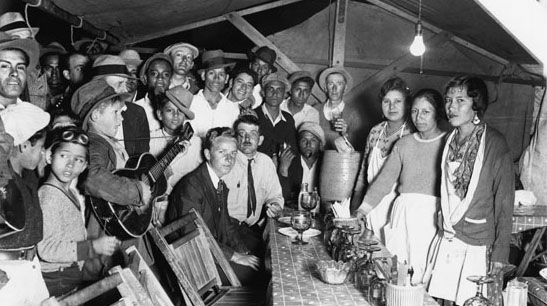Devour Borders: Mexican food as revolutionary praxis
Here's a pretty old post from the blog archives of Geekery Today; it was written about 11 years ago, in 2014, on the World Wide Web.
From Jeffrey M. Pilcher, The Rise and Fall of the Chili Queens, in Planet Taco: A Global History of Mexican Food (2012):
. . . Mexican food [from worker-owned street vendors] was also seen as a threat to white workers, both through unfair competition and labor radicalism. Nativist opponents of immigrant workers claimed that the Mexican diet of tortillas and chili, like the Chinese staple rice, undermined the nation’s standard of living. . . . Mexican food was also associated with anarchism and union organizing. Tamale vendors were blamed for the Christmas Day Riot of 1913, when police raided a labor rally in Los Angeles Plaza. Milam Plaza in San Antonio, where the chili queens worked in the 1920s, was a prominent recruiting ground for migrant workers. Customers could eat their chili while listening to impassioned speeches by anarcho-syndicalists of the [Industrial] Workers of the World[1] and the Partido Liberal Mexicano.[2]
–Jeffrey M. Pilcher, The Rise and Fall of the Chili Queens
in Planet Taco: A Global History of Mexican Food (2012), p. 113
So I just stumbled across this passage today; it’s kind of like a perfect addendum to the Xenophobia and Anarchophobia
/ U.S. vs. Them
section of my old No Borders / No State presentation, reheated, perfectly seasoned and cooked up together with everything I have to say about worker-owned, informal-sector food vendors and disruptive social and economic agoras.
See also.
- GT 2013-07-20: Authentic Mexican Food
- GT 2009-11-08: No Borders, No State: Anarchism, Immigration Freedom, and the Interconnection of Struggles
- [1]Original mistakenly reads
International [sic] Workers of the World,
a distressingly common mistaken expansion of the I.W.W.’s initials.↩ - [2]A Mexican anarchist revolutionary group, whose founders included Ricardo Flores Mag?@c3;b3;n, among others. After a series of strikes and uprisings they played a major role in the outbreak of the Mexican Revolution and briefly liberated Baja California from the control of the Mexican national government in 1911, with cross-border assistance from hundreds of I.W.W. anarcho-syndicalists from the U.S. After being defeated by the Mexican military and expelled from Mexico, members lived on in exile in southern California and central Texas.↩

Discussed at radgeek.com /#
Rad Geek People's Daily 2015-11-18 – War on the Informal Sector, Tamale Control Edition: